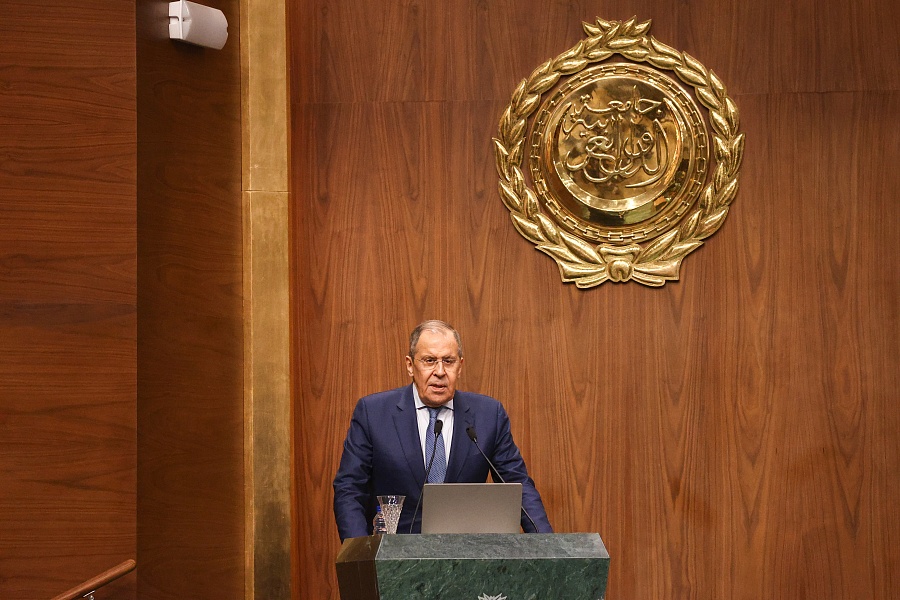Egypt heavily depends on Russian and Ukrainian grains, with 80% exported last year to the country.
Russia’s Foreign Minister Sergey Lavrov rejected allegations levelled against Moscow over a global food crisis, Qatar News Agency (QNA) reported on Sunday.
This came during a meeting in Cairo with the Arab League, attended by Qatar, where Lavrov claimed the crisis is due to the Covid-19 outbreak, not the Russian invasion of Ukraine.
Lavrov also expressed his country’s keenness on enhancing its partnership and economic cooperation with the Arab bloc, noting he is currently planning to hold a sixth meeting of the Arab-Russian Cooperation Forum as soon as possible.
Lavrov also met with Egyptian President Abdel Fattah El-Sisi and Foreign Minister Sameh Shoukry to discuss issues of mutual concern pertaining to grain and energy sales.
“We discussed specific parameters of cooperation in this area, agreed on further contacts between the relevant ministries, and we have a common understanding of the causes of the grain crisis,” Lavrov told a press conference alongside Shoukry.
Egypt heavily depends on Russian and Ukrainian grains, with 80% exported last year to the country. The shipments have been disrupted following the Russian invasion of Ukraine, leaving Egypt at a crossroads between its ties with the two warring countries.
Russia disrupted the supply chain by blocking Ukrainian ports near the shared Black Sea.
However, Russia and Ukraine signed an agreement brokered by the United Nations and Turkey to resume grain and fertiliser exports on Friday. Qatar welcomed the agreement, describing it as “a step in the right direction” to address global food shortages.
The identical agreement was signed separately by Russia’s Defence Minister Sergei Shoigu and Ukraine’s Infrastructure Minister Oleksandr Kubrakov as Ukrainian officials refuse to be involved in a single document with Russians.
This comes as the Russian invasion of Ukraine persists five months on.
The agreement entails the reopening of the blocked Black Sea routes, which has caused Ukrainian exports to drastically drop and pushed a spike in global grain prices. The accord seeks to return the total exports to their pre-war level of five million metric tonnes per month, as Reuters reported.
By signing the four-month deal, the conflicting countries agree on resuming grain shipments to tackle the impact of global food shortages, given Russia and Ukraine’s positions as some of the world’s largest grain exporters.
The landmark deal is subject to renewal unless the war ends. It will also pump wheat, sunflower, oil, fertiliser and other goods into world markets.
‘Acute hunger’
Shipments are set to be facilitated through a Joint Control Center (JCC) in Istanbul, overseen by officials from the signatories of the agreement. The ships can safely transit the Black Sea to Turkey’s Bosphorus strait before reaching global markets.
According to the UN World Food Programme (WFP), at least 47 million people are facing “acute hunger” amid fears of a global food crisis as long as Ukraine’s exports are blocked.
In the event of a breach of the maritime truce, the JCC would work on resolving the issue, according to a statement provided to Reuters by a UN official.
However, Russian missiles struck the southern port of Odesa on Saturday, just a day after the signing of the agreement, though no significant damage was reported.
President Zelenskiy described the attack as an act of “barbarism” though Russian officials denied involvement in the air strike. Russia’s defence ministry also did not reply to Reuters’s request for a comment.
According to the UN, civillian casualties in Ukraine surpassed 10,000, with more than 4,500 people killed since the start of the Russian invasion.
Qatar has repeatedly stressed the need for the Russian and Ukrainian sides to reach a political agreement.
“We are all aware that crises and wars in any region affect the entire world. The war in Ukraine has direct and indirect victims. This war has contributed to exacerbating an economic crisis that may lead to humanitarian disasters,” said Qatar’s Amir Sheikh Tamim bin Hamad Al Thani last week.







